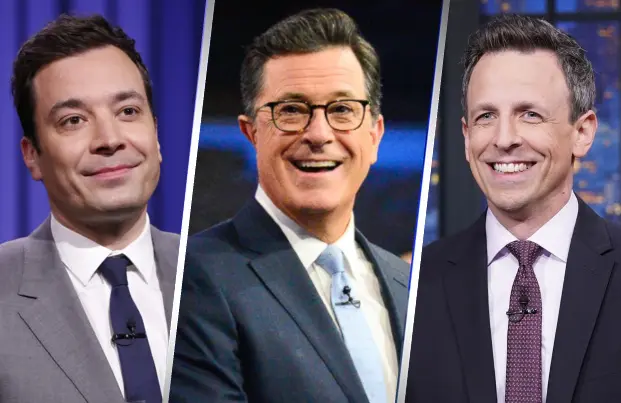Why the Late Night Shows are Going Live for the Debates
-
 Jimmy Fallon, Stephen Colbert, Seth Meyers and Trevor Noah will all host live editions of their shows following the first Democractic Presidential Debates this week.
Jimmy Fallon, Stephen Colbert, Seth Meyers and Trevor Noah will all host live editions of their shows following the first Democractic Presidential Debates this week.The last time four late night talk shows went live after a presidental primary debate was... well, never. But it's a sign of the times that The Daily Show with Trevor Noah, The Late Show with Stephen Colbert, The Tonight Show Starring Jimmy Fallon and Late Night with Seth Meyers will all air live shows this Wednesday and Thursday nights, following the first debates of the 2020 presidential election.
This didn't come out of nowhere, and indeed there's precedent for topical comedy shows airing live episodes tied to newsmaking events. Way back in 1992, Comedy Central inaugurated its live coverage of the race for president under the moniker "InDecision 92," hosted by Al Franken. Bill Maher took over four years later for "InDecision 96," and The Daily Show (then with Jon Stewart) and The Colbert Report would go on to routinely air live election night episodes during their long reigns, with Trevor Noah continuing the tradition after Stewart stepped down.
But it wasn't until the 2016 Presidential election that the network talk shows got into the act, with Seth Meyers airing live episodes of his show for both the Democratic and Republican Conventions and following the first Clinton-Trump debate. For his part, Colbert aired a live election night special on Showtime that year, and has offered up live editions of his Late Show for each of Trump's State of the Union addresses, and the midterm elections. And this week, Jimmy Fallon will go live for the very first time following a major political event.
So, what happened? Why the sudden rush for real-time political comedy? The easy answer is Donald Trump happened. Among many other things, the failed real estate developer has proven to be a goldmine for politically-minded comedy ever since he famously descended that escalator to announce his candidacy four years ago.
But in reality, there's more to it than just Trump. Thanks in large part to Jon Stewart, the influence of late night talk on the US political discourse has been on the rise for the better part of the last two decades. During his run on The Daily Show, Stewart elevated what was originally a light-hearted satire of primetime newsmagzine shows to often searing political commentary, perfectly formed for social media sharing and quick takes on the web.
Although Stewart has been gone from The Daily Show for three years now, his fingerprints are all over the current late night landscape. Colbert, of course, got his start on The Daily Show, and Stewart is an executive producer and a occasional on-air presence on The Late Show. Likewise, Meyers' Late Night has more in common with Stewart's Daily Show than it does the versions of Late Night that preceded him.
Late night hosts who don't traffic in political commentary are either derided for it -- as Jimmy Fallon was when he was roundly criticized for "normalizing" Donald Trump (as if such a thing were possible) -- or risk obsolesence amid declining ratings and a myriad of other offerings, as Conan O'Brien acknowledged when he revamped his own talk show earlier this year.
As the networks seemed to have learned, live broadcasts are an powerful way for networks to stay relevant and tap into the real-time zeitgeist propelled by social media. How else are they to compete with the hundreds of quality titles that await us in our Netflix queues? Hence the rise of live tv musicals (and all-star sitcom re-stagings), primetime airings of SNL, and shows like LivePD.
So why are the late night shows going live this week following the first debates? Perhaps the better question is why aren't they doing it every night?
TOPICS: Late Night, Comedy Central, Conan, The Daily Show with Jon Stewart, The Daily Show with Trevor Noah, Jimmy Kimmel Live!, Late Night with Seth Meyers, The Late Show with Stephen Colbert, The Tonight Show Starring Jimmy Fallon, Al Franken, Bill Maher, Jimmy Fallon, Jon Stewart, 2018 Midterm Elections, 2020 Presidential Election, Peak TV, State of the Union Address, Trump Presidency